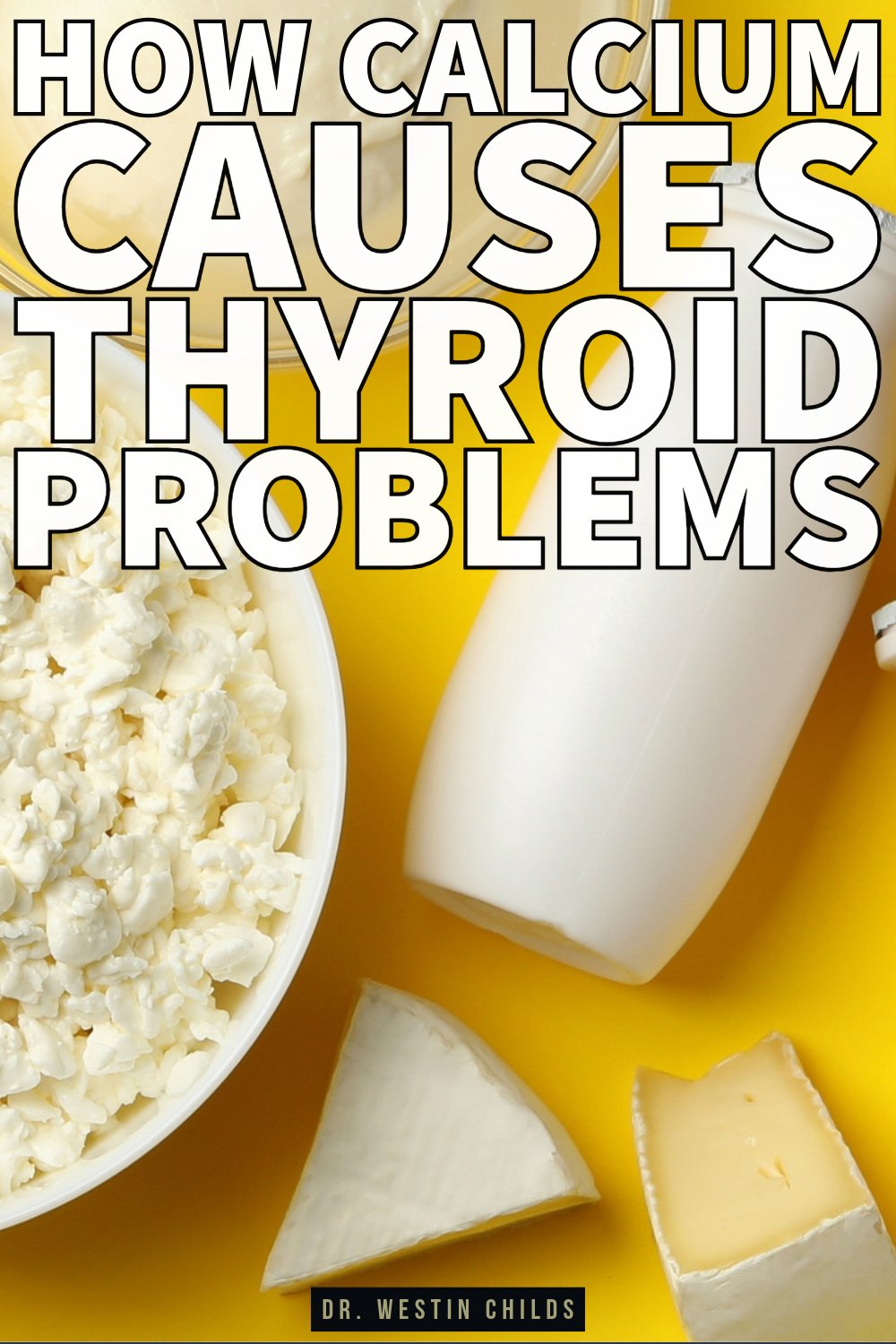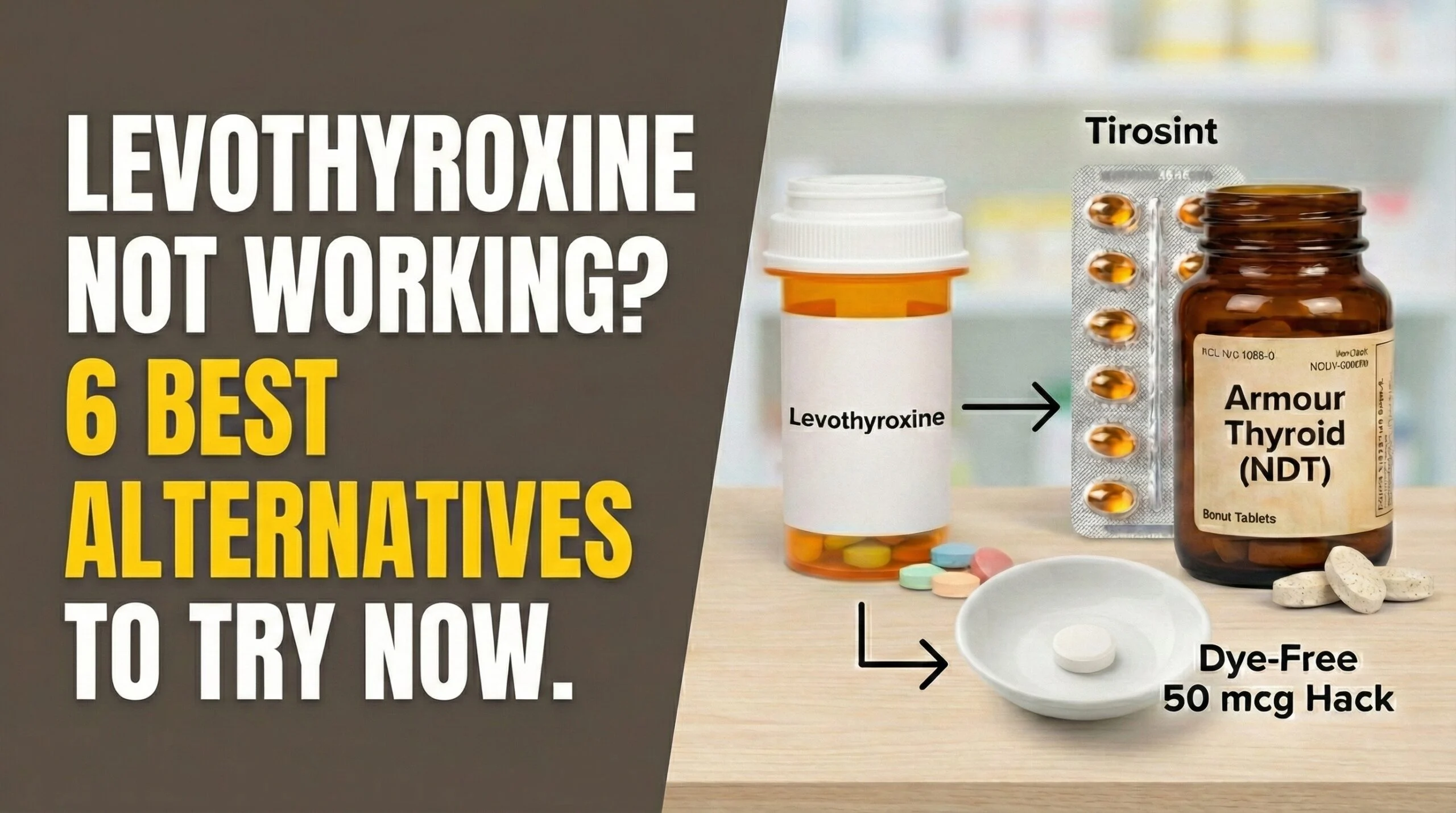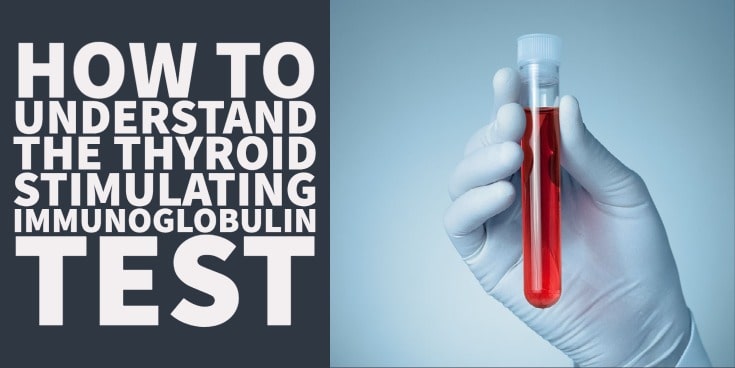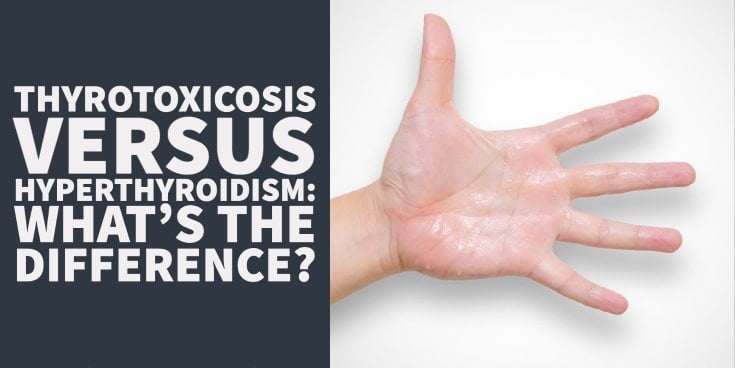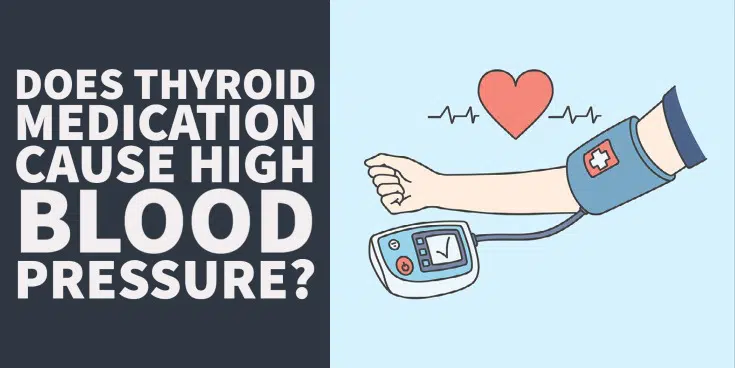Million and millions of thyroid patients are taking levothyroxine to support their thyroid every single month.
Unfortunately, many of them, may not be taking it correctly.
Thyroid medication is one of those medications that looks for just about any reason to not get absorbed.
And for you as a thyroid patient that is a big problem.
After all, the whole point of taking thyroid medication is to increase your thyroid hormone to bring your thyroid back to normal.
If your medication isn’t getting absorbed or used by your body then you won’t feel better.
The good news is that there are a few simple things that you can do to make sure that your medication is getting into your body.
One of those things is to avoid taking it with other supplements (and medications) that can cause problems!
Calcium is one such ingredient.
It is well known that taking calcium near the time that you take your thyroid medication can limit how much gets absorbed.
Today we are going to discuss this process in more detail.
You’ll learn:
- How calcium interferes with thyroid medication
- Why you must take calcium supplements (and foods that contain calcium) at least 4 hours away from whenever you take your thyroid medication
- More about the obvious and not-so-obvious sources of calcium (how you may be consuming it without realizing it)
- Why food sources of calcium can still cause issues
- How to take calcium supplements and thyroid medication together safely
- Why calcium supplements may not be the best way to improve bone health and other alternatives to consider
Let’s jump in…
The Effect of Calcium on Thyroid Medications
Hypothyroidism is a disease that predominately impacts women.
Women also happen to be the gender most at risk for bone loss.
And because many women around the age of perimenopause and menopause have both thyroid disease and bone loss, problems can start to arise.
These women are often told to start supplementing with calcium when they go in for their periodic DEXA scan.
The DEXA scan helps to assess bone density (1) and is often the first way women hear about their bone density status.
If your DEXA scan shows that you have some bone loss you will likely be told to start supplementing with extra calcium to try and prevent further issues.
If you don’t have a thyroid problem then that’s probably the end of your story.
But if you do have a thyroid problem and you are taking a thyroid medication like levothyroxine (or any other), then that’s where problems can arise!
What does calcium do when taken with thyroid medication?
It binds to the thyroid hormone found in the thyroid medication and renders it inactive (2).
It turns it into an insoluble or nonabsorbable complex which then gets eliminated in the stool.
This means that if you take your thyroid medication within several hours of when you took a calcium supplement, there’s a chance that some of that thyroid medication will be rendered inactive.
This is a big problem for you because you need that thyroid hormone to get into your body to help with things like energy, hair growth, metabolism, heart rate, hormone balance, and more.
Even if you were to take a calcium supplement and your thyroid medication at the same time (which isn’t recommended) not all of your thyroid medication would be rendered inactive.
Only a fraction of it wouldn’t make it into your body and into your cells.
But even if you limit the absorption of your medication by 10-30% that can still be a big deal in terms of its impact on your symptoms.
Often small changes to thyroid medication dosing can have a profound impact on how you feel day to day.
So you want to do everything in your power to make sure 100% of your thyroid medication gets into your body.
How do you do this?
By separating when you take your thyroid medication and calcium supplements by as much time as possible.
The magic number is at least 4 hours apart.
I will go over some additional details to help you understand how to take your thyroid medication below so stick around for those helpful tips.
TSH Suppression and Calcium Supplements
There’s one other group of thyroid patients that needs to be addressed before we move on to sources of calcium and that’s the group of thyroid patients with suppressed TSH levels.
A suppressed TSH just means that your TSH level is undetectable when you test for it and will usually be recorded as some value less than another value.
In other words, it will be represented as something like <0.004 uIU/mL.
This is a potential issue because a suppressed TSH slightly increases your risk of osteoporosis (3) and this effect is compounded if you are in menopause (4).

The combination of menopause and a suppressed TSH means that you are much more likely than the average thyroid patient to experience bone loss or osteoporosis which means increasing calcium intake is usually important.
In addition, because most patients with a suppressed TSH are doing so for purposes of preventing cancer recurrence (5), it’s also important that your dose of thyroid medication is not impeded!
If your TSH is suppressed then you need it suppressed and you have to juggle two things simultaneously:
- The need to keep your TSH suppressed with thyroid medication
- And the need to support your bones to prevent osteoporosis
For this group of patients, it’s very important that calcium is taken correctly so as to avoid any issues with thyroid medication absorption.
Obvious and Not So Obvious Sources of Calcium
Calcium is a mineral that your body stores in both the bones and the teeth (6) and is found in several different forms.
For the purposes of this article, you should be aware that all forms of calcium have shown to interfere with thyroid medication including calcium carbonate, calcium citrate, and calcium acetate.
They may differ slightly in how severely they impact thyroid medication absorption but they all can cause the same issue:
Binding and inactivating thyroid hormone.
And this appears to include food sources of calcium as well.
One study (7) illustrated this point by comparing thyroid patients taking their thyroid medication with and without a glass of milk.
Thyroid patients who took their thyroid medication without milk showed higher T4 levels when tested which suggested that the calcium found in cow’s milk was enough to limit some absorption of their medication.
For this reason, you should avoid taking your thyroid medication anywhere near any source of calcium including foods, supplements, and medications.
You are probably aware of the obvious sources of calcium but are you aware that calcium is often hidden in some medications and supplements?
Here is a list of potential sources of calcium to make sure that it doesn’t sneak into your diet without you knowing it.
Foods high in calcium include (8):
- Dairy products – Milk, yogurt, cheese, etc.
- Soybeans
- Dark green and leafy vegetables – Kale, spinach, collard greens.
- Calcium-fortified foods such as orange juice – Look for claims of extra calcium on the packaging!
- Beans and lentils
- Figs
- Sardines and Salmon
- Almonds
- Whey protein
These foods don’t contain calcium levels equal to that of calcium supplements but any source of calcium has a small potential to impact your thyroid medication.
For comparison, calcium supplements typically contain 500-1,000mg of calcium, and one cup of milk contains about 325mg of calcium.
It’s close but not quite the same as a pure calcium supplement.
Regardless, though, it’s still safer to avoid eating foods high in calcium around the time that you take your thyroid medication.
Obvious sources of calcium include:
- Calcium supplements
These are dedicated calcium supplements that most likely have the name calcium branded all over them.
Not so obvious sources of calcium include:
- Multivitamins
- Antacids for indigestion
- Prescription medications and over-the-counter medications
A good rule of thumb is to check all of our supplements and medications for hidden sources of calcium.
You can do this by either calling your pharmacy for information about your medications (including fillers and binders) or by looking at the supplement fact panel on the back of your supplement.
Calcium Supplements and Their Impact on Cytomel, Liothyronine, and NDT
What if you aren’t taking standard thyroid medications like levothyroxine or Synthroid?
Well, the information still applies!
While we don’t have as many studies showing a negative impact on other medications, we still have reason to believe that calcium can inhibit these other thyroid medications as well.
For this reason, the recommended advice of waiting 4 hours between taking thyroid medication and calcium applies to all thyroid medications including:
- Liothyronine
- Cytomel
- Nature-throid
- WP Thyroid
- NP Thyroid
- Armour Thyroid
- Tirosint
- Tirosint-Sol
- Levoxyl
- Other formulations of NDT
- SR T3
- Compounded T4 and T3 medications
- And all other thyroid medications and formulations
The reason is simple:
Even though these medications differ in names and hormone content they still all contain bioidentical thyroid hormones which means that these hormones still may be bound to by calcium.
Need to Take Calcium? Here’s How to Take it so Doesn’t Impact Your Thyroid
As mentioned above, you want to make sure that if you are taking calcium (from any source, food, or supplements) you take it at least 4 hours away from whenever you take your thyroid medication.
Some thyroid patients often get confused because they wrongly believe that they must take their thyroid medication at some specific time of the day (usually in the morning).
The truth is that you can take your thyroid medication at any time of the day, including in the evening.
In fact, some studies show that taking thyroid medication at night may be better (10) than taking it in the morning.
Understanding this gives you some wiggle room and can help you take your calcium as far away from your thyroid medication as possible.
For instance, a good strategy may be to take your calcium supplements in the morning and your thyroid medication in the evening (or vice versa).
If you have to take your thyroid medication in the morning and prefer to take your calcium with a meal (because maybe it hurts your stomach if you don’t) then make sure it’s split by at least 4 hours.
If you take your calcium supplement at 7:00 am then you will want to take your thyroid medication at 11:00 am at the soonest.
If you take your thyroid medication at 7:00 am then you will want to take your calcium supplement at 11:00 am at the soonest.
Make sense?
Good!
In addition to these rules, here are some additional helpful tips to make your thyroid medication more effective:
- Never take your thyroid medication at the same time as any other prescription medication or over-the-counter supplement (even if it doesn’t contain calcium).
- If you are taking a calcium supplement then take your thyroid medication 4 hours away (either before or after)
- If you are taking an iron supplement (10) then take your thyroid medication 4 hours away (either before or after)
- Most other supplements can be taken 30-60 minutes away from whenever you take your thyroid medication with the exception of iron and calcium.
- Take your thyroid medication with only water!
- Avoid taking your thyroid medication with coffee, milk, or any other liquid that isn’t water.
- Try taking your thyroid medication in the evening on an empty stomach right before you go to bed.
- Consider switching to a different type of thyroid medication such as Tirosint or Tirosint-Sol.
- Stay consistent with the time that you take your thyroid medication (take it at the same time every single day!)
These tips and tricks will not only prevent issues with calcium and other supplements but they can also help prevent absorption issues from other things such as food, liquids, medications, and other supplements.
Remember:
When in doubt, take your thyroid medication away from everything else!
Consider Alternatives to Calcium for Bone Health
Even though calcium supplements are frequently recommended for treating bone health, they may not be as beneficial as you think.
Many physicians, doctors, and experts (me included) recommend getting your calcium from natural sources as much as possible as opposed to using over-the-counter calcium supplements.
There’s actually a fair amount of controversy over calcium supplements, vitamin D, vitamin K2, and bone health.
I won’t get deep into the controversy except to highlight a few points.
The first is that there is some evidence to suggest that calcium found in food is more bioavailable (better absorbed) compared to the calcium found in supplements.
As a result, getting your calcium from food sources may be preferred.
In addition, calcium really doesn’t do much on its own because other nutrients are necessary to deliver the calcium to where it needs to go so that it can do its job.
Vitamins that help facilitate the function of calcium in the bones include vitamin D and vitamin K2 (11).
Some providers believe that taking calcium without vitamin D and K2 may be a waste and may even cause more harm than good.
We can simplify this controversy by making some general recommendations:
- If you need more calcium try to get that calcium from food as much as possible.
- If you do decide to use a calcium supplement then make sure your vitamin D level is optimized and consider taking vitamin K2 with it.
- Make sure you are putting physical pressure on your bones with weight-bearing exercises (this allows you to take advantage of Wolff’s law (12)).
- No matter what you decide to do, make sure you take your thyroid medication as far away from any source of calcium as possible.
Wrapping it up
Calcium is known to cause problems for thyroid patients because it interferes with thyroid medication absorption.
This interference applies to all thyroid medications and appears to stem from just about any source of calcium including medications, supplements, and even food sources.
If you are a thyroid patient taking thyroid medication then you should be aware of calcium’s potential negative impact!
You should also be aware of the potential sources of calcium so you can actively try to avoid them.
If you feel that you need extra calcium to support bone health then a better way of getting your calcium may be from natural food sources instead of supplements.
Food sources of calcium can still cause issues for thyroid medication absorption, though, so keep that in mind if you try to increase your intake of calcium-rich foods.
Now I want to hear from you:
Were you aware of the impact that calcium has on thyroid medication?
Did you know that this problem applies to all forms and versions of thyroid medications?
Are you taking a calcium supplement to support bone health?
Do you feel it’s working for you? Why or why not?
Leave your questions or comments below!
Scientific References
#1. my.clevelandclinic.org/health/diagnostics/10683-dexa-dxa-scan-bone-density-test
#2. ncbi.nlm.nih.gov/pmc/articles/PMC3092723/
#3. ncbi.nlm.nih.gov/pmc/articles/PMC7424360/
#4. ncbi.nlm.nih.gov/pmc/articles/PMC5643776/
#5. pubmed.ncbi.nlm.nih.gov/28960722/
#6. ncbi.nlm.nih.gov/pmc/articles/PMC6683260/
#7. pubmed.ncbi.nlm.nih.gov/29589994/
#8. ucsfhealth.org/education/calcium-content-of-foods
#9. pubmed.ncbi.nlm.nih.gov/21149757/
#10. pubmed.ncbi.nlm.nih.gov/9191742/
#11. ncbi.nlm.nih.gov/pmc/articles/PMC4566462/
#12. ncbi.nlm.nih.gov/pmc/articles/PMC4556408/
